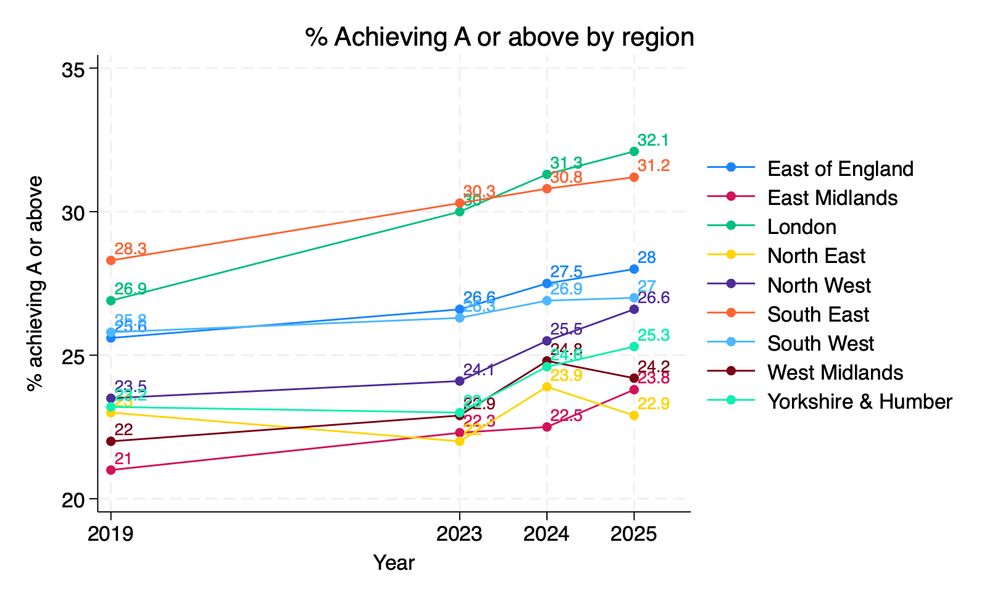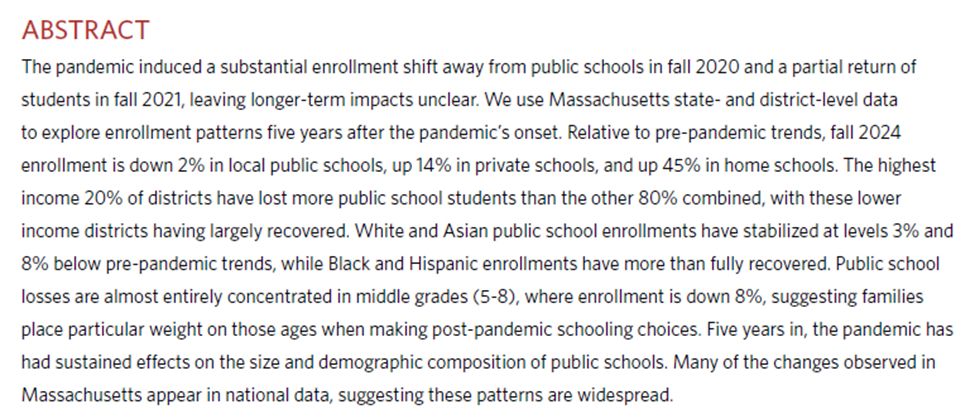
Economist working on inequality and access to education. Deputy Director of @cepeo-ucl. Research associate of @cep-lse Research fellow @iza_bonn
Reposted by Lindsey Macmillan

Thanks to our funders @nuffieldfoundation.org and
diversityandproductivity.com/about
Reposted by Lisa A. Gennetian, Judith Scott-Clayton, Peter Bergman

Reposted by Gill Wyness
We've had a productive year, with our researchers investigating topics such as
teacher assessed v exam grades
the impact of t-levels
the labour market talent pool
econpapers.repec.org/paper/uclcep...
Reposted by Lindsey Macmillan, Gill Wyness

"Measuring gaps in teacher judgements: A new approach"
with @lindseymacmillan.bsky.social, @richmurphy-econ.bsky.social and @gillwyness.bsky.social
Read the paper here: econpapers.repec.org/paper/uclcep...
🧵below
Important evidence for policymakers considering reducing the use of standardised testing.
And a great paper to work on with my colleagues @lindseymacmillan.bsky.social @opmc1.bsky.social @richmurphy-econ.bsky.social
Reposted by Gill Wyness
"Measuring gaps in teacher judgements: A new approach"
with @lindseymacmillan.bsky.social, @richmurphy-econ.bsky.social and @gillwyness.bsky.social
Read the paper here: econpapers.repec.org/paper/uclcep...
🧵below
Read:

Reposted by Lindsey Macmillan, Gill Wyness

Read:
Reposted by Gill Wyness

Demand is a lot more elastic for non EU students than the previous estimates of EU students, so we’d expect to see a bigger drop off than the HO estimated

ideas.repec.org/p/ucl/cepeob...
Reposted by Becky Francis
Again no details. But assuming the unis will have to pay the levy, and will pass it on to students
Its success will depend on how inelastic international student demand is. We don't have great evidence on this.
This could improve match between students and their degrees by signalling high value courses
Would benefit disadvantaged kids who are more likely to "undermatch"
www.journals.uchicago.edu/doi/full/10....
but will also narrow options
Reposted by Becky Francis

So its great to see this is finally (albeit partially) on the cards.
www.gov.uk/government/n...
Reposted by Gill Wyness

Estimating heterogeneous returns to college by cognitive and non-cognitive ability
by our @opmc1.bsky.social
econpapers.repec.org/RePEc:ucl:ce...
Reposted by Gill Wyness, Jake Anders
On the surface, today’s results seem cause for relative optimism.
Despite this cohort’s tough time — both final year at primary & first year of secondary were disrupted by COVID; rates of SEND and mental health issues also up among this group — there’s no results drop off.
Reposted by Gill Wyness

@gillwyness.bsky.social: The slight improvement in those with top grades "masks striking inequalities in achievement"
@miriched.bsky.social: It's unsurprising universities are increasing recruitment "because funding is difficult to manage”
uclioe.info/4fCqEup
Reposted by Dave O’Brien

Our PhD student @robbiemaris.bsky.social
has the answers, in his new paper:

But its not good news for everyone: with London & the South East continuing to pull away from the rest of the country, and boys slightly ahead of girls.
Reposted by Dave O’Brien, Gill Wyness

explore-education-statistics.service.gov.uk/find-statist...
Our new policy briefing is the must-read for parents, policymakers, and childcare providers: 3 clear, actionable recommendations based on the latest evidence on screen time and cognitive development.
🔗 econpapers.repec.org/paper/uclcep...
Read it below:
Reposted by Gill Wyness
Our new policy briefing is the must-read for parents, policymakers, and childcare providers: 3 clear, actionable recommendations based on the latest evidence on screen time and cognitive development.
🔗 econpapers.repec.org/paper/uclcep...
Parental strategy and school-level resources also play a role, with private institutions offering superior guidance
and support.

Even the weakest private school students aim higher than their higher achieving state school peers.

This is especially true for low attaining students: where private-school pupils enrol in courses as much as 15 percentiles higher than low attainers from other school types
Our aim is to understand the role these schools play in promoting access to selective universities.

Why are students from elite high schools much more likely to go to high ranked university courses than equally qualified students from the state sector? 🤔
w @opmc1.bsky.social @lindseymacmillan.bsky.social & Jo Blanden
econpapers.repec.org/RePEc:ucl:ce...
Reposted by Joshua Goodman, Gill Wyness

Our new @wheelockpolicybu.bsky.social working paper:
“School Enrollment Shifts Five Years After the Pandemic”
In it, BU Wheelock PhD @abbyfrancis.bsky.social and I ask:
Has the pandemic permanently changed families' schooling choices?
Reposted by Gill Wyness

showing huge improvements in literacy and numeracy for young adults between 2012 and 2023...
but a very concerning lack of progress for the lowest performing students
feweek.co.uk/bottom-10-pe...

